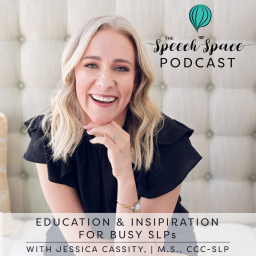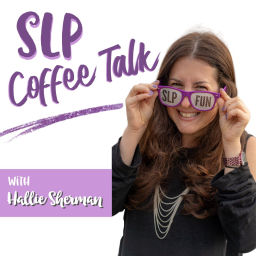
by Jessica Cassity, M.S., CCC-SLP
Looking for some fresh ideas for your speech therapy sessions? The Speech Space podcast is a podcast full of tips and resources for speech-language pathologists working in the schools or private practice.
Language
🇺🇲
Publishing Since
12/11/2018
Email Addresses
1 available
Phone Numbers
0 available

April 1, 2025
<p>This episode is about what SLPs need to know about reading comprehension. It begins by acknowledging that SLPs have a large scope of practice, and that they are not typically seen as the primary professionals who work on reading comprehension, especially in the school setting. It invites SLPs to make slight adjustments to their practice to ensure that students get the best support possible. The episode then emphasizes the idea that reading is an umbrella term composed of many sub-skills. It then moves into an overview of widely accepted reading models, including the Simple View of Reading, Scarborough’s Reading Rope, and the Active View of Reading. Strategies and suggestions are woven through the discussion of each model. The final segment of the episode highlights important considerations related to reading comprehension for student populations that may be particularly relevant to SLPs. The episode closes with a reminder of the role that reading comprehension plays in many aspects of our lives. </p>

March 4, 2025
<p>This episode is about sensory strategies for speech therapy sessions. It opens with an acknowledgement that OTs are the primary sensory experts, and offers resources for reviewing sensory basics. The episode then discusses the difference between being “sensory-defensive” and “sensory-seeking,” reviews the sensory system, and then moves into a discussion of strategies to support students with sensory differences or a diagnosis of sensory processing disorder. These strategies come from SLP and researcher Celeste Roseberry-McKibbin. The first strategy is addressing students’ physical comfort, the second strategy is including movement in speech therapy sessions, and the third strategy is supporting students during transition times. The episode then discusses the connections between interoception and emotions, and offers three strategies to help students begin to notice and understand these connections in their own bodies. These strategies come from occupational therapist Kelly Mahler, and they are objective labeling, “I wonder” statements, and descriptive language.</p>

February 4, 2025
<p>This episode is about essential counseling skills for SLPs. It begins by acknowledging that even though counseling is a daily component of our work as SLPs, it’s not necessarily something that we focus on. Research also indicates that counseling is an area where many SLPs lack confidence. The episode goes on to assert that counseling is simultaneously a bigger and a smaller part of speech-language pathology than we might think. It’s bigger because it’s part of everything we do, and it’s smaller because it’s not an additional task—it’s embedded in our interactions. The episode then cautions that not every type of counseling is within the SLP scope of practice, and sometimes referrals to mental health professionals are necessary. According to ASHA, the two types of counseling within the SLP scope of practice are informational counseling and personal adjustment counseling. Research done by Dr. David Luterman indicates that most SLPs are less confident with personal adjustment counseling. The remainder of the episode focuses on personal adjustment counseling tips from Dr. Luterman’s work. They include recognizing the role of grief, listening actively, and tending to our own personal growth.</p>

SLP Now

Sarah

Venita

Hallie Sherman

ART19 Uniquely Human

Jess Massey

Three Percent Chance

Kendra, The Lazy Genius

Vox Media Podcast Network

Tara Phillips

Mel Robbins

Kelly Vess, MA, CCC-SLP

Cari Ebert

Bishop Robert Barron

Tara-Leigh Cobble
Pod Engine is not affiliated with, endorsed by, or officially connected with any of the podcasts displayed on this platform. We operate independently as a podcast discovery and analytics service.
All podcast artwork, thumbnails, and content displayed on this page are the property of their respective owners and are protected by applicable copyright laws. This includes, but is not limited to, podcast cover art, episode artwork, show descriptions, episode titles, transcripts, audio snippets, and any other content originating from the podcast creators or their licensors.
We display this content under fair use principles and/or implied license for the purpose of podcast discovery, information, and commentary. We make no claim of ownership over any podcast content, artwork, or related materials shown on this platform. All trademarks, service marks, and trade names are the property of their respective owners.
While we strive to ensure all content usage is properly authorized, if you are a rights holder and believe your content is being used inappropriately or without proper authorization, please contact us immediately at [email protected] for prompt review and appropriate action, which may include content removal or proper attribution.
By accessing and using this platform, you acknowledge and agree to respect all applicable copyright laws and intellectual property rights of content owners. Any unauthorized reproduction, distribution, or commercial use of the content displayed on this platform is strictly prohibited.